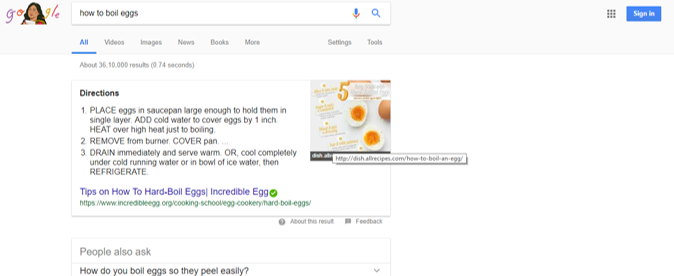On Page SEO is the Yin to backlinks’ Yang. You need both of them in perfect harmony in order to have the perfect landing page that can attract customers to your website. But what are the critical components that can help you do the same? Here, we try to do the same by answering all of the general questions surrounding the topic and especially the questions that are present on Quora so that by the time you finish reading this, you can understand, What is On Page SEO and how can it help boost my business?
What is On Page SEO and how can it help boost my business?
1. What are the SEO guidelines to create a URL slug?
SEO and other optimizations of your website are incomplete without optimizing your URL slug. Now to describe slug in simple words would be the URL which appears on Google. It is exactly below the title and appears in a green color. Here is how it looks:
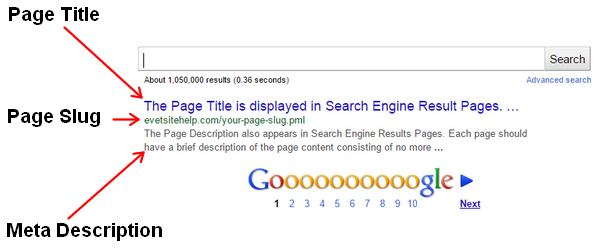
Keep your URL slugs clean and attractive. A slug which gives you a clean description, and tells you what you’d find, is the best one. Another great SEO advice is to use the main keyword in your slug, to tell the user exactly what you will offer.
The slugs which are gibberish and do not give a clear-cut idea of what the website is offering is not going to bring you traffic. So here are some guidelines one must follow:
- Keep your URL clean.
- Try to use your Main keyword.
- Tell the user what you’ll find.
- Look at some of the other slugs, which are clean for an idea.
It has been found that users prefer clicking on those URLs which are easy to understand. A slug which offers no information on the content or is confusing is only a bad practice for your website.
2. Do hidden pages that don't appear on a website get indexed by Google and rank well for specific keywords?
Hidden pages showing up or not showing up has a simple answer. If you put it out on the web, it is pretty much there. There are chances that these pages may not show up as mentioned in one the answers.
However, why would you want to write a page only to hide it? Honestly, once the page is written, and has some keywords, it is bound to show up in your search results.
3. Does specifying the language of your website in the coding have any affect on your SEO results?
The easiest way to answer it would be with a no. Google does not care about the coding or the meta description used for the website, Google and its bots are interested in the content.
With the help of your content, they will recognize the location of your page and the website. And that is all. However, the HTML language may come into play when your content has mixed language, which is a bad, bad practice for any kind of website. But apart from that Google will not do anything special for your website.
As stated earlier, it may, however, it may be important if the language used by if there are several areas which use the same language. But then again, that is only for a few cases. Google takes your content into consideration.
4. What is the difference between keyword spamming, keyword stuffing and keyword density?
SEO optimization is a game based on keywords, which give your ranking. However, the game is not completely dependent on simply the use of keywords. Use keywords to make your content attractive.
Keyword spamming and keyword stuffing are the same things.
The meaning of Keyword stuffing could be loosely understood as the practice of manipulating their SERP rankings. However, it could work for bloggers before, but in today’s time the bots ranking the website have matured, and this practice will only bring your website’s ranking down.
It must be noted that keyword stuffing is different from using keywords in your content. A writer or blogger may use many keywords in the same sentence, and that may not be called keyword stuffing. The trick to striking a balance between all of this is, to use the keywords efficiently.
Your sentences should make sense. Keyword stuffing makes the content redundant as well as seem unreasonably un-understandable.
Keyword Density, on the other hand, is a confusing matter. Although the definition is pretty simple, it is hard to know what percentage is the correct amount for your website. Even the use of tools cannot predict the perfect percentage.
According to Wikipedia, Keyword Density is the percentage of the number of times the keyword appears on the webpage.
Although it is common to think that a website with a higher keyword density will have a better ranking, it must be remembered that there are other methods of getting a good ranking and there are other aspects of SEO.
5. Why is it wise not to use too many SEO keywords in your content?
Using keywords for your content is a good practice. However, it does not go to say that more keywords are a good thing for your website.
The practice of keyword stuffing for your website’s content is something that attracts many people and makes them believe that this will get them a better a ranking for their website on Google. It may seem plausible, but you couldn’t be more wrong about it!
The number one driving factor for a better ranking is the nature of your content, stressing on nature. For you are writing for humans, and the use of some keywords is understandable, but use too much of it, and you’re bound to get a bad ranking.
Furthermore, Google bots have matured over the last few years. They not only look for keywords, but their searching and ranking process compares your content to other higher ranked websites. And if you make use of a similar language, a similar kind of content flow, the bots will give you a better ranking.
All in all, it is safe to say that website’s ranking has always revolved around the content of the website and it has never been about the keyword density and will never be.
Here are some ways how you can improve the quality of your website:
- Relevant and fresh data, which is interesting.
- Plan properly.
- Create links.
- Stick to the topic.
6. How hard is it to get to the front page of Google with a keyword that says the competition is low?
The easiest answer to the question would be, “it depends on the competition”. You could write an amazing article on something too popular, and you may not rank as high as other links. However, you may write an okay-ish article on an unfamiliar or random oh-not-so-popular topic, and get a Google first page ranking.
So, as I was saying the competition matters. Another practice for a good ranking is using long tail keywords. This is quite popular; these keywords are phrases, mostly or could be three or four words used together.
So, if you are focusing on keywords, make sure that you focus on higher ranked keywords, there are ample of tools which help you choose the best keywords to use in your articles you may use any of the SEO tools available or maybe use the keyword tool for searching keywords for free. However, I would recommend this only for beginners.
7. Is copying text from my own other articles from the same blog ok?
We are all aware of the “plagiarism” issue. Well, for those who are not aware of the term, the term describes the practice of copying matter from other websites, or in simple words not creating original content. It is highly frowned up.
However, most bloggers and website owner consider copying their own text and pasting it. Some even do it for their guest blogs. So, there is a question of the validity of such practice and the legal aspects of copying your own content.
As per the usual notion, copying is bad. It is not correct to copy anybody’s content and paste it, even if you are the one who wrote it. Furthermore, copying your own content is called “duplicate content”. As you all must know, the trick to a good website and a good rank is to create original and interesting content. Copying your content defeats the purpose.
Although creating an original content may be hard, it is advised that people modify the content around the matter already available. Interesting content will always bring you more traffic.
However, there are some inhibitions on the general notion of “copying- a bad practice” and “duplicate content- bad for your website”. Here is what I found when I searched for duplicate content:
- There is no clear evidence that it brings your website ranking down.
- However, there was only one instance when the website had been blacklisted by Google, and from that instance, we can infer that:
- Duplicate content will affect you when there are many copies of the content at the same time.
- The copied content happens at the same time.
Apart from that, there have been numerous instances where nothing happened to website or the blog.
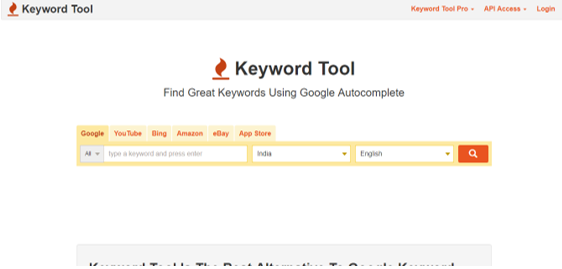
8. What is the best way to "Track the keyword Ranking". How I can get to know the work which is affecting my ranking?
With SEO and optimization, one must remember the aspect of rankings as well. Ranks are important, but to know which aspect of your website is generating the most traffic or which practices are making you lose traffic is a must.
This would work for all SEO practitioners. However, choosing the best ranking tool may seem to prove to answer your question and solve your problem, the fact that you need to understand how these rankings work is important.
First of all, you need to understand that most people usually go with the first link on the search page. And another thing, that you need to pay attention to your SERP rankings. The best practice would be to make use of good keywords and trending keywords, all which can be found on the Google Search Console, which is free!
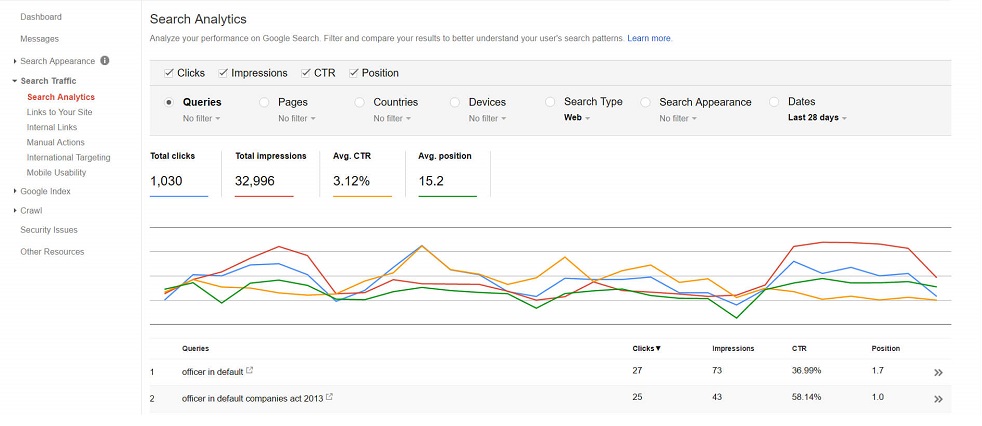
Next, you need to understand which aspects of your website need to be optimized according to the searches. Furthermore, you should keep in touch with Google Updates, which happen often. A tool for tracking ranking with the option of checking updates per day should be a good option.
Other than this, another impressive tool is the Nozzle, which offers the user a detailed graph of what work gets you more traffic, which areas are not working as they should be and much more. It fairly simple to use and it keeps updating you with Google algorithm updates.
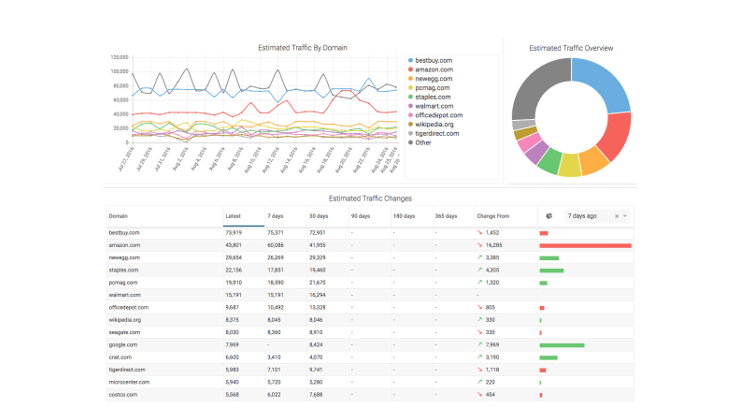
9. My site doesn't rank in targeted location, but ranks everywhere else for targeted local keyword. Why?
The problem behind rankings on Google could be many. However, the biggest driving factor could be in your citations listings.
Although it may seem like a big problem, it is quite easy to fix. The best way to do this would be to fix your website and business’s rankings and optimization. The first step in the right direction and to solving this problem is to get your Business on Google maps.
Another way to target a local area is to optimize your website and its content according to the location and not the language of the areas.
Furthermore, you could try fixing other optimization issues and look local SEO methods to fix your business’s ranking. Have a look at tips to improve your SEO and to know how to fix your Local SEO for better rankings.
10. What are some good examples of hyper-local content for a franchise?
The term hyper local became popular in the year 2009, and it roughly means to create a content which gives you a “boom.”
This type of marketing is basically used to attract the members of the same community, much like marketing close to home. And most people do not understand the basics of working with a local area with Franchise, and it may also be a bit hard for you to get it done with the same.
Hyper-local marketing will work better when you work with your own business, or probably you start with something new. But with a franchise, your chances are quite limited.
However, if you do wish to create something hyper-local, I would suggest anything you can find that will sort of hit “close to home” would work the best for such scenarios. Anything that catches the eyes of the local people and attracts them to the business would be a good place to start.
Hyper local content with a Franchise, however, may not really be possible. Any kind of franchise is obviously a brand in itself. Therefore, it is next to impossible to create a hyper-local content for a franchise.
11. If I want to move indexed content from one URL to another, do I still need to 301 redirect or can I just remove those old URL's from the index?
Although there are other ways of moving your website from one domain to another, 301 redirect would possibly be the best option for you and your content.
What 301 redirect does is, that it takes your viewer to a new website. The viewer can view the same article without any problems.
However, there are other ways which may interest you. One such way would be copying your original article and paste it on the other website. But it will still be duplicate content.
Another way would be to delete the entire page, which would give the 404 message to your viewer. Or you could actually make use of both the websites, and keep the content exactly where it was.
With these many options, the less troublesome and the easiest way keeping your viewers as well as content you should definitely use 301 redirect.
12. What are the best practices for title tags for local search engine optimization?
Tags are the boldest and the most attractive part of your content. The title tag appears on the search results and appears many times on your web pages as well. And the same can be said for your Local searches and Local optimization.
Title tags are a part of meta tags. These tags are not only descriptive but also offer an insight of your content. The tags need to simple, minimalistic and attractive.
Some Basic Guidelines for the Best Title Tags for a Local Business
The best practices to get the best title tags for local SEO are:
Verify your business on Google maps after claiming a name for your business. Make sure you use the correct name, address and phone numbers. The procedure takes a week or two.
Update your phone numbers. To gain maximum traffic your business, make sure you keep your phone numbers updated, as the search would show something like this:
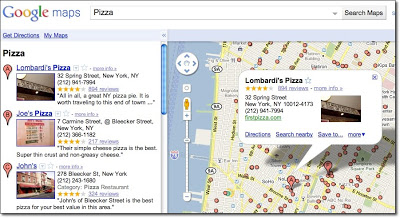
- Apply business related snippets. Try to keep them as rich as possible. The following is how a rich snippet looks like:
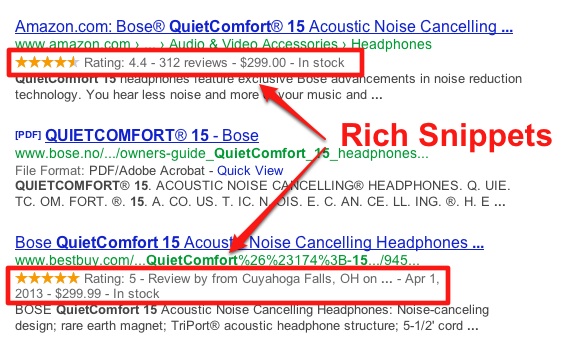
- Embed maps and directions on your website, for the ease of the viewer.
13. In SEO are there specific rich snippets for local business?
There are various reasons to look for and to try to get the rich snippets for your local business. The best snippet would be to let the user know what you offer in the most simple terms.
However, getting the correct snippet may be a problem. But it can be easily solved with the help of a tool, such as schemaapp. The main thing this tool does for you is to tell the search engine what your website’s content actually means.
This tool allows you to create the perfect snippet. But you must be careful when you describe your business on the tool; it will have a direct effect on your ranking and listings. The tool gives you a chance to be seen by the users.
Other than this, one could adopt various kinds of strategies, which allows the user to create a rich snippet and gives the user an idea of the business. For better snippets, try to adopt the following:
- Use videos, these will appear when you demonstrate DIY projects.
- Ratings and reviews, when you have a good rating, your snippet will be something like:

- Get on the map, if you are trying to target the local audience.
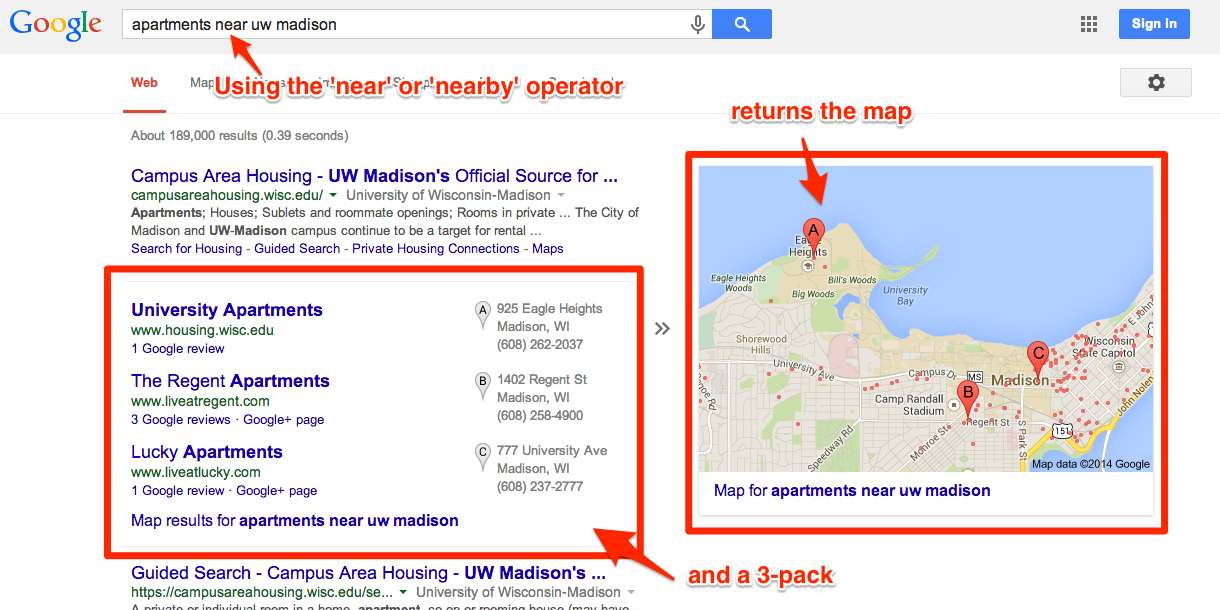
However, you must remember that a rich snippet may not allow you to get the traffic you desire. In some cases, it so happens that due to the increased efficiency of Google’s searching and processing, the engine gives the answer directly to the user. Although answering the queries of the users through blogs is a staple, but you might find that creating a rich snippet may mean you are giving up on some of your traffic. An example of this is:
